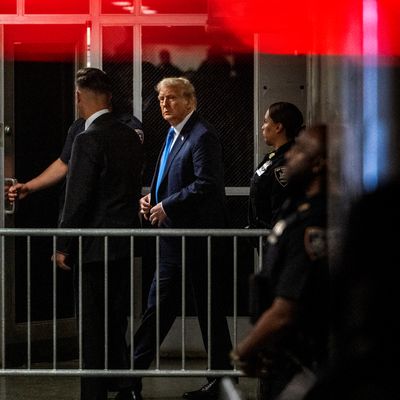
Donald Trump spent Monday morning in state criminal court in lower Manhattan, where his attorneys and lawyers for District Attorney Alvin Bragg gave opening statements in his hush-money case. But just two blocks away, Trump was granted a reprieve in another suit, his civil-fraud case, of which he was found liable in February for $464 million, including interest, for lying about the value of his properties. In the civil case, Justice Arthur Engoron allowed a California surety company to post bond after resolving issues about the money — and other legal issues — raised by the New York attorney’s office last week. (And what exactly is a bond in a case like that? More about that below!)
This suit is just a small part of the sprawling web of charges that he’s facing in New York; Washington, D.C.; and Georgia — but, unlike most of those others, this one has been decided, and the judgment is already draining his cash reserves as he prepares for the 2024 presidential election. For a while there, it looked like he would either be forced into a fire sale, or Attorney General Letitia James would make good on her threat to seize 40 Wall Street, one of the developer’s landmark properties. Still, the bond has become a window into Trump’s complicated finances. Here’s everything we know:
The purpose of the bond
In February, Trump appealed a ruling from Judge Engoron that would have put him and his companies on the hook for $355 million, plus about $110 million more in interest. (Donald Trump Jr., Eric Trump, and Trump’s former CFO Alan Wiesselberg were also found liable.) But in order for that appeal to proceed, Trump had to post either the outstanding penalty himself or put up enough collateral so that a financial company could post his bond. The bond is essentially money set aside to pay should he lose his appeal, or that he will get back if he wins it. Defendants typically transfer cash and easily tradable stocks as collateral to a financial company, like an insurance company, which in turn provides the court with cash — and ultimately pay the penalty upon losing.
Trump’s appeal is likely to take months, but could conclude before the November election. His argument is expected to focus on statements from Deutsche Bank, his lender, that it never relied on his fraudulent documents to give him his loans.
Why Trump couldn’t pay
At first, it was the amount. The vast majority of Trump’s roughly $6.5 billion fortune is tied up either in real estate or shares of his media company, of which he is the majority owner. (Those shares are subject to a lock-up agreement that doesn’t allow him to sell until later this year.) He had already posted a $92 million bond in the defamation case against writer E. Jean Carroll — a case he lost, and is also currently appealing.
In March, lawyers for Trump said that they had contacted 30 surety companies and could not find a single one that could post Trump’s nearly $500 million bond — which would have been the largest in New York history. Trump had a separate appeal asking the courts to lessen the bond amount to $100 million. On March 25, the upper court lowered the amount to $175 million.
Who posted the bond
Knight Specialty Insurance, a California financial company, agreed to pay the bond earlier this month. The company is owned by Don Hankey, a billionaire used-car salesman who makes his money through high-interest auto loans to people who are less likely than normal to pay their bills.
Earlier this month, Knight filed a lien on a Trump-owned investment account holding $175 million. That account was then presented to the court as proof that Trump would satisfy the requirements for the bond.
The issues with Knight
Since Knight has emerged as Trump’s financial lifeline, the attorney general’s office has raised issues with their ability to pay the money. For one, Knight is based in California and wasn’t registered to post bonds in New York. They also questioned whether Knight would be able to meet the state’s legal requirements for insurance companies to hold enough collateral, should they go bankrupt before the bond is due.
On April 19, the attorney general’s office questioned whether Knight was actually in receipt of Trump’s collateral — essentially, the money held by the surety company that would be used to pay the bond. Knight’s financial documentation included “only a single screenshot” of a Schwab account, and it wasn’t clear if the funds were in cash or other investment funds, which could fluctuate in value with the market, according to a filing. The attorney general’s office also questioned the arrangement that would have transferred money over to Knight. That Schwab account was still controlled by the Trump Organization, and Knight retained a priority lien on it, which could have, in theory, allowed Trump to drain the funds before the appeals court reached its conclusion.
Engoron’s ruling on the bond
During a Monday hearing, Justice Engoron expressed his skepticism about Trump’s arrangement with Knight. “It all seems a bit like a house of cards to me,” Engoron said, according to The Wall Street Journal. However, rather than voiding the bond agreement, Engoron allowed it to through with tightened requirements: The funds will stay in cash, Knight will retain full control of the money, and the company will provide monthly statements on the funds to the court. (Knight also said it was able to post bond in the state through another insurance market). “There are no games. There’s no trap door. It’s $175 million in a bank account. The money is there. It’s not going anywhere,” Chris Kise, an attorney for Trump, reportedly said in court.






























